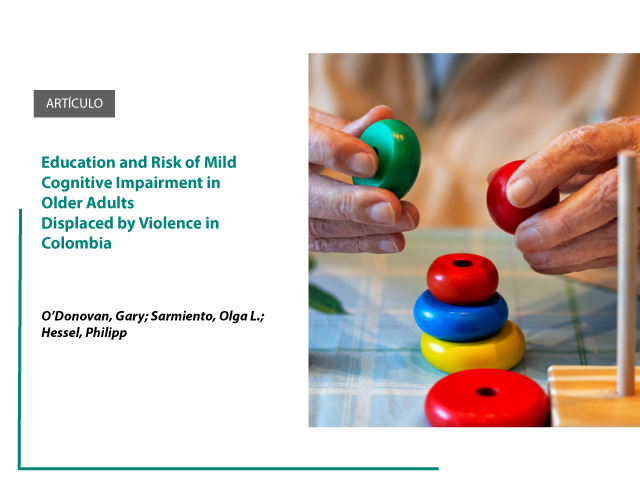[Artículo]
Los invitamos a leer el siguiente artículo que contó con la participación de la Dra. Olga Lucía Sarmiento.
Abstract
Education may play an important role in building cognitive reserve and reducing the risk of dementia.1 However, exposure to traumatic events may have a “scarring” effect and increase the risk of mental illness across the life course.1,2 Education is associated with reduced risk of mild cognitive impairment in the general population,3 but more research is required to determine whether education reduces the risk of mild cognitive impairment in people who have been displaced by violence.2 Six million people are thought to have been displaced by violence in Colombia in the past 50 years.4 We used data from the National Survey of Health, Wellbeing and Aging in Colombia to investigate associations between education and mild cognitive impairment in people who had been displaced by violence.
The National Survey of Health, Wellbeing and Aging in Colombia is described elsewhere.5 The methods used in the present analysis are also described elsewhere.6 Briefly, participants were community-dwelling adults with age 60 years or older. The dependent variable was mild cognitive impairment. Trained interviewers administered a shorter version of the mini-mental state examination, and mild cognitive impairment was defined as a score of 12 or less out of 19. The independent variable was displacement by violence. Participants were asked if they had ever been displaced by armed conflict or violence. The covariates included age, height, education, current income, civil status, smoking, alcohol drinking, and physical activity. Participants were asked about the highest level of education they had achieved, and three groups were created: no education; some primary education; and, some secondary education or more. Logistic regression was used to model associations between education and cognitive impairment (Stata MP version 15.1, StataCorp, TX). We modeled age as a continuous variable and all other covariates as categorical variables. We used the estimated coefficients from the fitted logistic regression models to calculate risk differences, with marginal standardization for handling of the covariates.
eTable 1 (https://links.lww.com/EDE/B895) shows participants’ characteristics. The prevalence of mild cognitive impairment was 19% in 19,276 adults who had not been displaced by violence and 21% in 4,413 adults who had been displaced by violence [contrast of risks of mild cognitive impairment adjusting for age and sex (95% confidence interval): 0.04 (0.03, 0.05)]. There were some missing values, as shown in the table, and the analytic sample included 1,901 males and 1,866 females who had been displaced by violence. The risk (95% confidence interval) of mild cognitive impairment was 0.25 (0.22, 0.29) in males with no education, 0.11 (0.09, 0.12) in males with some primary education, and 0.08 (0.04, 0.12) in males with some secondary education or more. The risk of mild cognitive impairment was 0.36 (0.32, 0.39) in females with no education, 0.13 (0.11, 0.15) in females with some primary education, and 0.07 (0.03, 0.11) in females with some secondary education or more. eTable 2 (https://links.lww.com/EDE/B895) shows the age when participants were first displaced by violence and the number of times they were displaced.
The 2016 peace deal between the Colombian government and the FARC guerrillas was intended to end a war that is thought to have displaced millions of people.4 Nonetheless, displacement by violence is an ongoing problem7 and the United Nations has urged the Colombian government to do more to implement the peace deal.8 Given that education may build cognitive reserve and may reduce the risk of dementia,1 it is concerning that many schools are closed in the rural areas of Colombia most affected by violence. Although this analysis suggests that education is associated with reduced risk of mild cognitive impairment even in older adults who have been displaced by violence, more should be done to end the cycle of low education and violence in Colombia. The questionnaire used in the present study is a valid screening tool,9 but it is not a clinical diagnosis of cognitive impairment. Longitudinal studies with clinical measurements are needed to confirm associations between education and cognitive impairment in people who have been displaced by violence.













